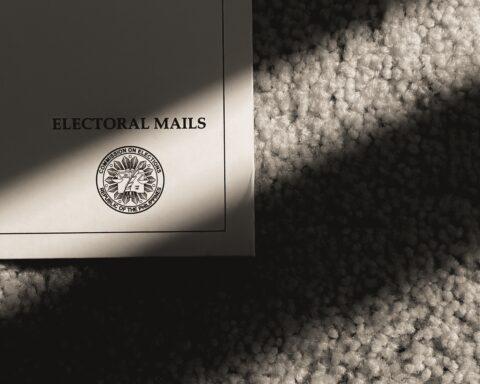![]() I was in Victoria last weekend, where you can’t drive a block without seeing an Elizabeth May lawn sign. When I landed back in Montreal on Sunday night, the taxi took me through quiet streets lined with Liberal campaign signs, with the odd NDP placard here and there.
I was in Victoria last weekend, where you can’t drive a block without seeing an Elizabeth May lawn sign. When I landed back in Montreal on Sunday night, the taxi took me through quiet streets lined with Liberal campaign signs, with the odd NDP placard here and there.
A very unscientific observation, to be sure. But it still got me wondering: in an age when the polling industry is in flux, can campaign signs offer voters a way of doing their own on-the-ground analysis — of tracking how a particular candidate or party is faring in a single riding?
The research suggests it can. In her article ‘Front Yard Signs As Predictors of Election Outcome’, academic Barbara Sommer compared signage to the results in U.S. election campaigns and concluded that “the results support the use of signs as a trace measure in predicting voter behaviour.”
[S]ignage can indicate momentum — but not engagement.
In Calgary, political analysts Duane Bratt and Janet Brown came to the same conclusion after doing their own study of lawn signs. “I think we proved this is a pretty good way of predicting votes,” said Brown.
Signage is a useful stand-in for a campaign’s outreach efforts, so it can offer a rough indication of how a campaign is going on the ground. What it can’t do is predict how many of a candidate’s supporters will actually turn out to vote. So signage can indicate momentum — but not engagement.
Elections fought on the ground
So maybe you’re asking yourselves — who cares, Ilona? Why trouble us with lawn signs while the Duffy trial is going on? Isn’t Duffy going to have more impact on the election than signage? Maybe so.
Maybe not. The trial of Senator Mike Duffy is the centre-ring act in the election drama right now and the pundits are falling over themselves in their rush to tell us how it will affect the result in October. But that’s the view from five miles up, while elections — all elections — are fought on the ground, in communities.
Personal contact matters. Signage is a measure of how the ground game is going.
The parties know this. This is the age of social media but party workers still knock on doors, still ask supporters to put up lawn signs. Personal contact matters. Signage is a measure of how the ground game is going — and if the parties take it seriously, maybe we should too.
So if you’re willing to bypass the polls for a while and do your own research, here are a few tips:
Talk to your neighbours. Don’t just talk to the people you agree with politically, or the ones actively involved in the campaign. Ask everyone. Talking about the election also has the added benefit of motivating non-voters to get out to the polls.
Count the number of party workers coming to your door. In-person contact with voters remains the single most powerful tool for mobilizing a voting base. If you don’t already have an election sign up (the one sure way to deter candidates from other parties), keep track of who comes to your house and drops off a pamphlet. This can give you a good sense of who has the best ground game — who might be most effective at mobilizing voters.
Federal elections happen coast to coast — but they’re fought, and won, riding by riding.
Count campaign signs. Compare the mix of party signs in your district with neighbouring ridings. Are certain parties/candidates showing a larger presence in, say, the suburbs than in urban areas?
Federal elections happen coast to coast — but they’re fought, and won, riding by riding. The pundits and pollsters can give you the background and the big picture, but they can’t do a better job of tracking the ground game than you can.
So block out the noise (if you’re able) and keep your eyes open. At the very least its a useful reminder that, in the end, elections aren’t about what politicians want. They’re about what we want.
Ilona Dougherty is co-founder of Apathy is Boring, a national non-partisan charitable organization that uses art and technology to educate youth about democracy and encourages them to vote. She is a regular commentator in national media, a published author, and speaks to audiences internationally about redefining intergenerational relationships and encouraging active citizenship.
Published in partnership with iPolitics.ca.





